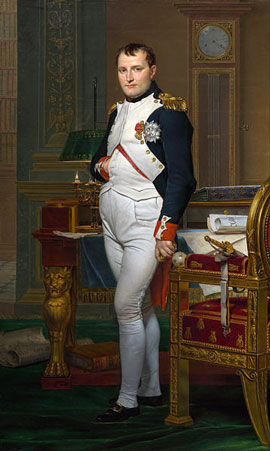Worthing versus Napoleon
BRITAIN was at war with Napoleon, who had crowned himself Emperor of the French the previous year. But Worthing in 1805 was a peaceful, pleasant place and crowds of the nobility would travel from their summer homes in Brighton to take part in (or bet on) pony and donkey races organised on our `rather superior’ sands by the Marquis of Blandford and Lady W Gordon.

A local chronicler of that year recorded: `Worthing beach, without a cliff, at low water extends six miles and at ebb tide nearly three-quarters.
`The ladies and gentlemen take delightful walks and in other parts it is occupied by some of the best cricket players in England, the sands being so fine and level….’
In 1805 it is recorded that on one occasion the sands `seemed positively crowded with carriages of`a great party of nobility from Brighton’ which created a problem, the like of which the town has often suffered from since – insufficient accommodation for all its visitors.
As there were only three inns in the village (for Worthing at that time could hardly be called a town) only forty-two of the one hundred and fifty three visitors could obtain any refreshments, `or even a dinner.’
Twenty-seven of them eventually dined at the house of Mr Hogsflesh while a few, we are told, were fortunate to get `some rather inferior accommodation’ at the Admiral Nelson `a small inn higher up the town.’
Later that year, on the 26th of August 1805, Worthing did become the centre of more warlike excitement, when, within clear sight of the shore, a French privateer captured a sloop laden with Eastern merchandise to the value of £7,000. That was a huge fortune in those days.
Fortunately for local morale, the loyal inhabitants had the satisfaction of seeing the sloop retaken by an English Revenue cutter, which then set out in pursuit of the enemy privateer, ultimately capturing it and taking it into Littlehampton Harbour.
There were `great doings’ when patriotic Worthing residents celebrated what they believed to be the final defeat of Napoleon and proclamation of peace in 1814 (never guessing that Napoleon would make a temporary come-back the following year).
Peace day was a bright one in early spring and set apart as a general holiday. Every parishioner was invited to a bountiful repast, set out on tables surrounding the Steyne Gardens, which were then un-enclosed and unplanted but with a solitary elm standing in the centre of the field.
A grand banquet was also held at the Steyne Hotel, with the avowed object of `celebrating the downfall of the tyrant Napoleon and the restoration of the Bourbons.’
Little did the joyous Worthing revellers realise that he would slip away from his captors on the island of Elba and that the Battle of Waterloo still had to be fought and won.